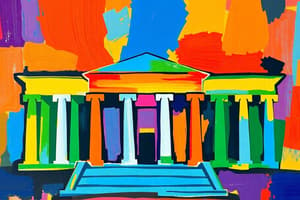Podcast
Questions and Answers
What was the claim in Lemon v. Kurtzman (1971)?
What was the claim in Lemon v. Kurtzman (1971)?
The government cannot use public funds to pay for anything religious.
What decision did the Court make in Agostini v. Felton (1997)?
What decision did the Court make in Agostini v. Felton (1997)?
The Court overruled its former decision regarding public school teachers in parochial schools.
Did the Court find that Alabama's law allowing religious prayer in schools violated the Establishment Clause in Wallace v. Jaffree (1985)?
Did the Court find that Alabama's law allowing religious prayer in schools violated the Establishment Clause in Wallace v. Jaffree (1985)?
True (A)
The Louisiana law in Edwards v. Aguillard (1987) required schools to teach creation science alongside evolution.
The Louisiana law in Edwards v. Aguillard (1987) required schools to teach creation science alongside evolution.
Did the Court find the Kentucky law requiring the posting of the Ten Commandments in schools constitutional in Stone v. Graham (1980)?
Did the Court find the Kentucky law requiring the posting of the Ten Commandments in schools constitutional in Stone v. Graham (1980)?
What did the Court decide regarding the New Jersey law on transportation subsidies for Catholic schools in Everson v. Board of Education (1947)?
What did the Court decide regarding the New Jersey law on transportation subsidies for Catholic schools in Everson v. Board of Education (1947)?
Did the Court rule that the Christmas display in Lynch v. Donnelly (1984) violated the Establishment Clause?
Did the Court rule that the Christmas display in Lynch v. Donnelly (1984) violated the Establishment Clause?
Did the Board of Regents' prayer authorized in Engle v. Vitale (1962) pass the constitutional test?
Did the Board of Regents' prayer authorized in Engle v. Vitale (1962) pass the constitutional test?
Flashcards are hidden until you start studying
Study Notes
Lemon v. Kurtzman (1971)
- Established that government cannot use public funds for religious purposes.
- Reinforced the principle of Separation of Church and State.
Agostini v. Felton (1997)
- Overturned Aguilar v. Felton, which prohibited public school teachers from teaching in parochial schools.
- Court found no evidence that teacher presence led to state-sponsored religious indoctrination.
Wallace v. Jaffree (1985)
- Addressed Alabama law permitting regular religious prayer in public classrooms.
- Court ruled this practice endorsed religion, violating the Establishment Clause.
Edwards v. Aguillard (1987)
- Louisiana's "Balanced Treatment for Creation-Science and Evolution-Science" law was struck down.
- Failed three-prong test of the Establishment Clause: lacked secular purpose, advanced religious views, and entangled church-state interests.
Stone v. Graham (1980)
- Kentucky law requiring posting of the Ten Commandments in public classrooms deemed unconstitutional.
- Court determined the requirement had no secular legislative purpose and was overtly religious.
Everson v. Board of Education (1947)
- New Jersey law allowing transportation reimbursements for Catholic school students upheld.
- Court reasoned that public services provided to parochial schools were separate from religious functions.
Lynch v. Donnelly (1984)
- Court ruled that a city's Christmas display, including a nativity scene, did not violate the Establishment Clause.
- The display was viewed contextually as part of the holiday season rather than promoting a specific religious message.
Engel v. Vitale (1962)
- New York Board of Regents authorized a voluntary prayer for school days, deemed unconstitutional.
- Court ruled this practice constituted official approval of religion, violating the Establishment Clause despite its nondenominational nature.
Studying That Suits You
Use AI to generate personalized quizzes and flashcards to suit your learning preferences.




